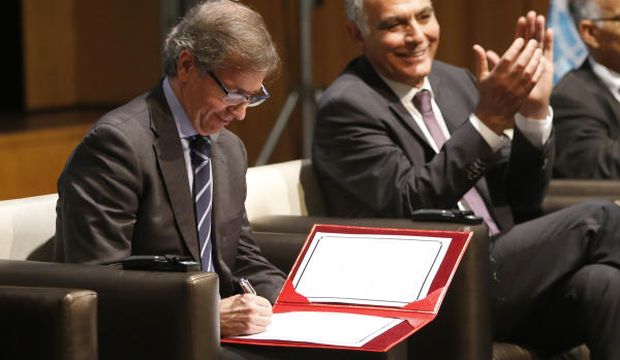
UN Envoy to Libya Bernardino León (L) signs the document on a new version of a UN-brokered peace deal as Morocco’s Foreign Minister Salaheddine Mezouar applauds, at the Palais des Congres of Skhirat in Rabat, Morocco, on July 11, 2015. (AP Photo/Abdeljalil Bounhar)
Rabat and Tobruk, Asharq Al-Awsat—Some of Libya’s rival factions on Saturday reached a UN-brokered agreement to form a unity government and end the fighting in the war-torn country. However, members of one of the factions chose not to attend the ceremony to sign the deal at the Moroccan coastal resort of Skhirat where peace talks were being held.
Libya currently has two parliaments, the General National Congress (GNC) in Tripoli and the internationally recognized House of Representatives in the eastern city of Tobruk. Each side has appointed its own government and is also backed by an armed faction.
Saturday’s agreement was signed between members of the House of Representatives and some officials from the capital Tripoli and the western city of Misrata. The latter are allies of Libyan Dawn, the Islamist armed faction supporting the GNC.
The deal proposes a one-year unity government with a council of ministers headed by a prime minister and two deputies. This body would have executive powers in the country.
Members of the GNC would form the majority of a 120-member State Council, but the House of Representatives would act the legislative authority in the country.
It is this latter point which the GNC has objected to and has been a point of contention since both sides met for the first time for the UN-sponsored talks in Skhirat at the end of June.
But Mowafaq Hawas, one of the GNC’s representatives at the talks, told Reuters his side was “still in the dialogue, but we don’t really understand why they are rushing to sign before all the parties agree.”
At the deal-signing ceremony in Skhirat, Special UN Envoy Bernardino León said “the doors will remain open for those who have chosen not to be here.”
He said the deal marked “an important step in the road of peace in Libya.”
The current power struggle between the GNC and the House of Representatives began last August when the latter, just newly elected, was forced out of Tripoli after Libyan Dawn took over the capital and reinstated the Islamist-dominated GNC.
Members of the House of Representatives then fled to Tobruk where they then set up a rival power base.
While Libyan Dawn supports the GNC in Tripoli, the Libyan National Army led by renegade Gen. Khalifa Haftar is now allied to Tobruk. Fierce battles have raged between both armed factions across the country.
Despite the signing of the deal on Saturday, some sources allied to the Tobruk side expressed concern over the agreement.
Libyan military sources told Asharq Al-Awsat representatives from Libyan Dawn had attempted during the negotiations to convince León to remove Haftar as head of the armed forces.
Salah Al-Din Abdul Karim, another military source, said meanwhile he did not approve of the power-sharing agreement since it would return to power the the GNC, whom he labeled as “representatives of the [Libyan Dawn] militias,” despite their being “voted out of power by the Libyan people.”
“The mandate of the previous parliament [the GNC] was ended by the Libyan people in fair elections in front of the entire world. What is the meaning of working with them again in any way when this contravenes the will of the Libyan people?” he asked.
“The whole country got behind the army after it experienced . . . the rule of the militias and the chaos they created throughout the country . . . What is happening today under the hand of León is the return of the rule of the extremists.”
